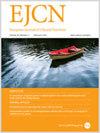围产期母体乳脂摄入生物标志物与儿童认知发展之间的关系:EDEN 母子队列的研究结果。
IF 3.6
3区 医学
Q2 NUTRITION & DIETETICS
引用次数: 0
摘要
背景/目的:后代的最佳神经发育取决于围产期母体膳食中的脂类供应。乳制品是西方饮食中脂肪的重要来源。本研究旨在通过围产期生物流体中的生物标志物(C15:0 和 C17:0)评估孕期母体乳脂摄入量与儿童认知结果之间的关系:参与者(多达 1200 人)为 EDEN 队列研究中的法国母婴对。对以下生物流体中的生物标志物进行了评估:妊娠24周时的母体红细胞膜、脐带红细胞膜和初乳。认知结果包括 2 岁和 3 岁时的语言能力评分以及 3 岁和 5-6 岁时的整体认知发展评分。相关性采用多元线性回归模型进行评估,并对与家庭社会经济背景、母亲生活方式和健康饮食评分相关的因素进行了调整。还研究了母乳喂养时间与初乳中乳脂生物标志物之间的相互作用:结果:脐带血红细胞中的 C17:0 和母体血红细胞中的 C15:0 水平与语言能力呈正相关。在母乳喂养至少 6 个月的儿童中,初乳中 C15:0 的水平与 3 岁儿童的语言能力以及 3 岁和 5-6 岁儿童的整体认知发展呈正相关,而 C17:0 的水平仅与 3 岁儿童的整体认知发展相关:我们的研究结果表明,母亲在围产期摄入较多的乳脂可能与后代较好的认知发展有关。这些开创性的结果需要外部验证,以质疑其因果关系。本文章由计算机程序翻译,如有差异,请以英文原文为准。

Associations between perinatal biomarkers of maternal dairy fat intake and child cognitive development: results from the EDEN mother-child cohort
Offspring’s optimal neurodevelopment depends on maternal dietary lipids supply during the perinatal period. Dairy products are an important source of fat in Western diets. This study aimed at examining the associations between maternal dairy fat intake during pregnancy, evaluated through biomarkers in perinatal biofluids (C15:0 and C17:0) and child’s cognitive outcomes. Participants (N up to 1200) were French mother-child pairs from the EDEN cohort study. Biomarkers were assessed in the following biofluids: maternal red blood cells (RBC) membrane at 24 weeks’ gestation, cord RBC membrane, and colostrum. Cognitive outcomes were language abilities scores at ages 2 and 3 years and overall cognitive development scores at ages 3 and 5–6 years. Associations were assessed using multiple linear regression models adjusted for factors related to family socioeconomic context, maternal lifestyle, and healthy diet score. Interaction of any breastfeeding duration on the associations with dairy fat biomarkers in colostrum was studied. Positive associations were observed between levels of C17:0 in cord RBC and C15:0 in maternal RBC with language abilities. In children breastfed for at least 6 months, C15:0 level in colostrum was positively associated with language abilities at age 3 years and overall cognitive development at ages 3 and 5–6 years whereas C17:0 level was only associated with overall cognitive development at age 3 years. Our results suggest that maternal higher intake of dairy fat during perinatal period could be potentially associated with offspring’s better cognitive development. These pioneering results call for external validation to challenge their causality.
求助全文
通过发布文献求助,成功后即可免费获取论文全文。
去求助
来源期刊
CiteScore
10.60
自引率
2.10%
发文量
189
审稿时长
3-6 weeks
期刊介绍:
The European Journal of Clinical Nutrition (EJCN) is an international, peer-reviewed journal covering all aspects of human and clinical nutrition. The journal welcomes original research, reviews, case reports and brief communications based on clinical, metabolic and epidemiological studies that describe methodologies, mechanisms, associations and benefits of nutritional interventions for clinical disease and health promotion.
Topics of interest include but are not limited to:
Nutrition and Health (including climate and ecological aspects)
Metabolism & Metabolomics
Genomics and personalized strategies in nutrition
Nutrition during the early life cycle
Health issues and nutrition in the elderly
Phenotyping in clinical nutrition
Nutrition in acute and chronic diseases
The double burden of ''malnutrition'': Under-nutrition and Obesity
Prevention of Non Communicable Diseases (NCD)

 求助内容:
求助内容: 应助结果提醒方式:
应助结果提醒方式:


